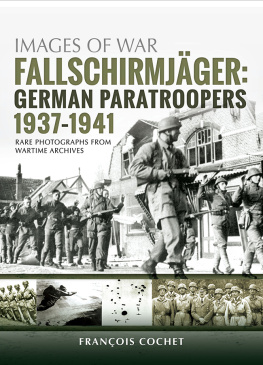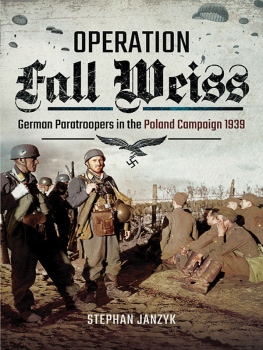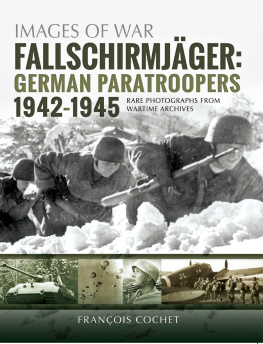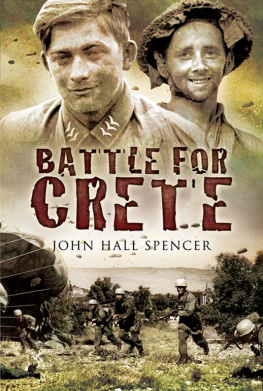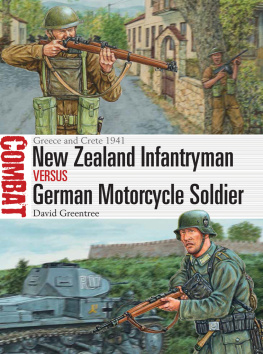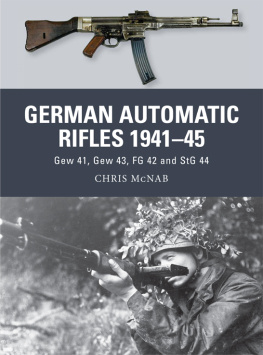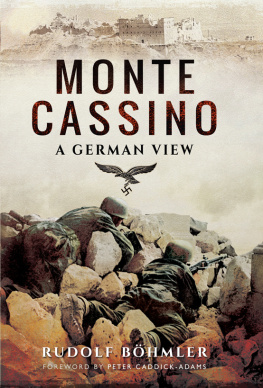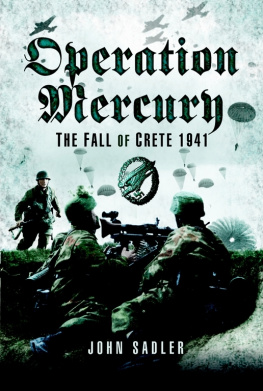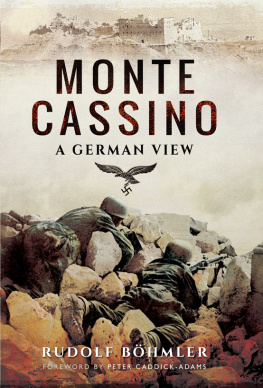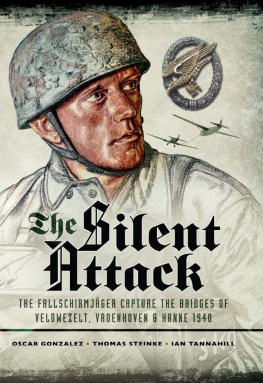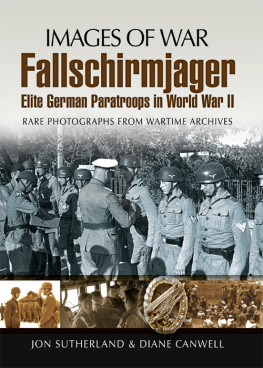
I MAGES O F WAR
FALLSCHIRMJGER: GERMAN PARATROOPERS 19371941
I MAGES O F WAR
FALLSCHIRMJGER: GERMAN PARATROOPERS 19371941
RARE PHOTOGRAPHS FROM WARTIME ARCHIVES
FRANOIS COCHET
: Les
Parachutistes Allemands (Tome I: 1937-1941)
First published in Great Britain in 2019 by
Pen & Sword Military
An imprint of
Pen & Sword Books Ltd
Yorkshire - Philadelphia
Copyright Franois Cochet, 2019
ISBN 978 1 52674 066 3
eISBN 978 1 52674 067 0
Mobi ISBN 978 1 52674 068 7
The right of Franois Cochet to be identified as Author of this work has been asserted by him in accordance with the Copyright, Designs and Patents Act 1988.
A CIP catalogue record for this book is available from the British Library.
All rights reserved. No part of this book may be reproduced or transmitted in any form or by any means, electronic or mechanical including photocopying, recording or by any information storage and retrieval system, without permission from the Publisher in writing.
Pen & Sword Books Ltd incorporates the Imprints of Pen & Sword Books Archaeology, Atlas, Aviation, Battleground, Discovery, Family History, History, Maritime, Military, Naval, Politics, Railways, Select, Transport, True Crime, Fiction, Frontline Books, Leo Cooper, Praetorian Press, Seaforth Publishing, Wharncliffe and White Owl.
For a complete list of Pen & Sword titles please contact
PEN & SWORD BOOKS LIMITED
47 Church Street, Barnsley, South Yorkshire, S70 2AS, England
E-mail:
Website: www.pen-and-sword.co.uk
or
PEN AND SWORD BOOKS
1950 Lawrence Rd, Havertown, PA 19083, USA
E-mail:
Website: www.penandswordbooks.com
Introduction
T he bloody fighting of the German Fallschirmjger (paratroopers) of the Second World War had inspired many kinds of books due to the fact that, assimilated to elite troops, airborne units of the Third Reich were regularly engaged at the forefront of the fighting. Famous victories, including the raid on the Belgian fort of Eben-Emael in May 1940 and the battles for control of the big island of Crete just a year later, remained in the collective unconscious, granting the paratroopers a kind of aura (sometimes a little exaggerated) and building an excellent esprit de corps amongst the troops.
In any case, however, the great age of the Fallschirmtruppen (parachute units) was to end in 1941. From 1942 until the end of the conflict, German paratroopers were most often deployed in a more classical way, although some battles (like Cassino or Leros) allowed them to reconnect with their recent and glorious past.
Image Credits - The majority of photographs in this book are from the authors collection, as well as those of several other people: Bernd Bosshammer, Jean-Pierre Chantrain, Jean-Louis Roba and Peter Taghon. Documents also come from magazine and from various contemporary books on the Fallschirmjger. Thanks must go to all those who helped to make this book.
Mini Glossary
Australian and New Zealand troops.
German code name for the invasion of the USSR on 22 June 1941.
lightning war.
The Eagle (the official illustrated Luftwaffe magazine).
German transport glider.
German encoded transmission machine.
Plan Yellow (German code name for the invasion of Western Europe on May 1940).
German paratrooper.
Fortress Netherlands
Parachute Regiment ( Fallschirmjgerregiment ).
German Air Division.
German air corps.
colour sergeant.
Major General.
German army.
literally heroes cemetery, a German military cemetery.
captain.
infantry division.
German three-engine transport aircraft manufactured by Junkers.
second lieutenant.
German air force
German code name for the invasion of Greece.
German code name for the invasion of Crete.
machine gun (Maschinengewehr).
first lieutenant.
colonel.
Reich Labour Service ( Reichsabeitsdienst ).
British Air Force (Royal Air Force).
training period for a military recruit.
Knights Cross of the Iron Cross.
Ritterkreuztrger (or RKT): a recipient of the Ritterkreuz.
Sea lion (German code name for the invasion of England).
assault regiment (one of the German airborne units).
Ultra: British apparatus decrypting Enigma messages.
operation.
the unified armed forces of Germany - aviation ( Luftwaffe ), army (Heer) and navy (Kriegsmarine).
German code name for the invasion of Scandinavia.
Useful dates for this volume
11 November 1918: end of the First World War.
28 June 1919: Treaty of Versailles.
16 April 1922: Treaty of Rapallo aimed at a rapprochement between Germany and the USSR.
30 January 1933: Adolf Hitler is appointed as Chancellor of the Reich and the Nazi Party take overall power of the German government.
15 May 1933: Ministry of Aviation (Reichsluftfahrtministerium) is established.
29 January 1936: first Fallschirmjger units are established.
1 July 1938: Generalmajor Kurt Student takes command of German airborne units.
23 August 1939: Nazi-Soviet Pact.
1 September 1939: German troops invade Poland.
3 September 1939: Great Britain and France declare war on Germany. Beginning of the Second World War.
17 September 1939: Soviet troops invade Poland. Polish government leaves for Romania.
26 September 1939: end of the Polish campaign.
7 April 1940: start of Operation Weserbung (German invasion of Denmark and Norway).
13 April 1940: Second Battle of Narvik.
14 April 1940: Allies land at Narvik and Namsos.
1 May 1940: surrender of Norwegian troops.
5 May 1940: the king of Norway and his government leave for London.
10 May 1940: start of the Westfeldzug. Capture of Eben-Emael and the bridges on the Albert Canal.
German paratroopers jump into the Netherlands.
13 May 1940: Allied attacks on Narvik.
14 May 1940: bombing of Rotterdam.
15 May 1940: surrender of the Netherlands army.
3 June 1940: Retreat of Allied troops in Norway.
4 June 1940: fall of Dunkirk.
21 June 1940: the French surrender is signed in Rethondes.
16 July 1940: Hitler issues Kriegsweisung No. 16, authorising Operation Seelwe (the invasion of Great Britain).
13 August 1940: start of the major German aerial offensives on England.
28 October 1940: Adolf Hitler meets Benito Mussolini in Florence following the launch of the Italian offensive against Greece. The Fhrer does not offer to send Fallschirmjger.
29 October 1940: Commonwealth troops land on the island of Crete.
10 December 1940: transfer of X. Fliegerkorps to Sicily. Germany is now committed in the Mediterranean.
11 December 1940: Operation Felix (capture of Gibraltar) officially abandonned.
13 December 1940: Hitler issues Kriegsweisung No. 20, authorising Operation Marita (the invasion of Greece).
18 December 1940: Hitler issues Kriegsweisung No. 21, authorising Operation Barbarossa (the invasion of the USSR).
11 January 1941: Hitler issues Kriegsweisung No. 22, authorising the engagement of German units in the Mediterranean.
8 February 1941: Great Britain agrees to provide military support to Greece.
12 February 1941: General Erwin Rommel arrives in Tripoli.
14 March 1941: end of the Italian offensive in Albania.
Next page
